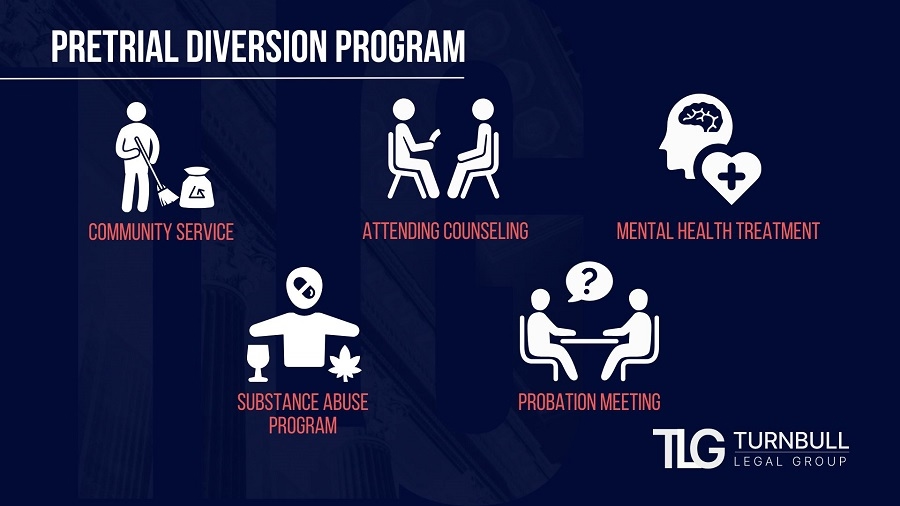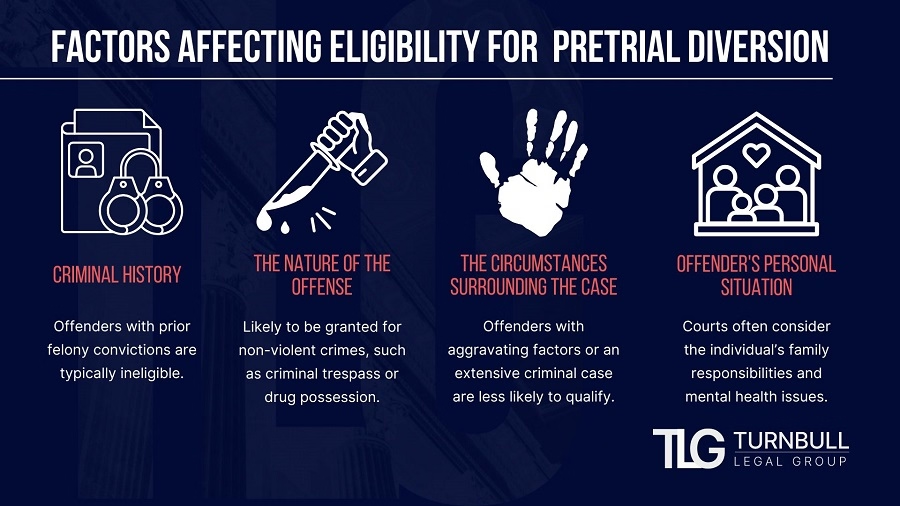If you're facing criminal charges in Texas, you might have heard about the state’s pretrial diversion program. By completing this program, which focuses on rehabilitation rather than punishment, you could avoid a criminal conviction.
How does pretrial diversion work, and who is eligible? Turnbull Legal Group will break down the essential facts of pretrial diversion in Texas, including how it can help you avoid a permanent criminal record.
What Is Pretrial Diversion Under Texas Law?
Pretrial diversion in Texas is a voluntary program designed to give first-time or low-level offenders a chance to avoid a criminal conviction by completing a set of requirements instead of going to trial.
These programs are generally overseen by the local probation department or the district attorney’s office. They are offered at the discretion of the district attorney.
How Does Pretrial Diversion Work in Texas?

The concept behind pretrial diversion programs is simple: They not only reduce strain on the court system but also give eligible offenders the chance to avoid jail and a criminal record.
If an offender is accepted into the Texas pretrial diversion program, their charges are put on hold while they complete certain obligations, such as:
- Performing community service hours
- Attending counseling
- Completing a mental health evaluation or treatment
- Entering substance abuse treatment
- Meeting regularly with a probation officer
If the offender successfully completes the program, their charges may be dismissed. The offender may also be eligible to have the arrest expunged.
Am I Eligible for Pretrial Diversion in Texas?

Not everyone qualifies for pretrial diversion. Generally, these programs are reserved for first-time offenders or individuals facing low-level misdemeanor charges.
Specific eligibility criteria may vary by jurisdiction, but in general, the district attorney considers the following factors:
- Criminal History
Offenders with prior felony convictions are typically ineligible.
- Nature of the Offense
Many pretrial diversion programs focus on nonviolent crimes, such as criminal trespass or possession of controlled substances.
- Circumstances Surrounding the Case
If there are aggravating factors or multiple potential charges, the individual may not qualify.
- Offender's Personal Situation
Courts often consider the individual’s family responsibilities and mental health when determining eligibility.
An attorney familiar with the local courts can help you determine whether the district attorney is likely to agree to pretrial diversion for your case.
Pretrial Diversion vs. Deferred Adjudication
Many people confuse pretrial diversion with deferred adjudication. While both programs help offenders avoid a criminal conviction, there are key differences.
Pretrial diversion does not require the offender to enter a guilty plea before starting the program. Upon successful completion, the charges are often dropped.
Deferred adjudication requires a guilty or no contest plea, and the case is dismissed upon successful completion of the probationary period. However, the record of the plea remains visible to the public.

Who Is in Charge of Pretrial Diversion Programs?
Most pretrial diversion programs are run by the local district attorney's office or the probation department. These offices set the guidelines for each participant, ensuring that they meet the necessary requirements and are given support. Often, a probation officer is the participant’s primary contact as they complete the requirements.
What Is a Pretrial Diversion Program Like?
Once accepted into a pretrial diversion program, participants are expected to fulfill certain obligations. These may include:
- Community Service Hours
Offenders may need to perform a specific number of community service hours as part of the program.
- Restitution
For theft and similar crimes, the offender may be required to repay any victims.
- Substance Abuse Treatment
For offenses involving drugs or alcohol, participants may be required to complete a treatment program or attend DWI education courses.
- Mental Health Treatment
If mental health was a factor in the offense, participants may be ordered to undergo psychiatric evaluations and treatment.
- Regular Check-Ins with a Probation Officer
The officer will monitor the participant’s progress.
At its discretion, the district attorney’s office may impose a range of other conditions, such as avoiding alcohol and maintaining steady employment.
Benefits of Pretrial Diversion
When a conviction seems likely, someone who has been charged with a crime can greatly benefit from pretrial diversion.
These are just some reasons to take this option if it is offered:
- No Conviction
The charges are typically dropped, and the offender will not have a conviction on their record.
- Future Opportunities
Participants can avoid barriers to employment, housing, and education that often come with a criminal record.
- Personal Growth
Programs often focus on rehabilitation, offering counseling, substance abuse treatment, and other support to help offenders turn their lives around.
By completing the program, the offender can not only avoid a conviction but also access the substance use or mental health treatment they need.
What Happens If You Fail to Complete Pretrial Diversion?
While pretrial diversion offers many benefits, failure to complete the program can have severe consequences. If a participant violates the terms, they will likely be discharged from the program. The district attorney may then prosecute them for the alleged crime. In these instances, the court will take into consideration the offender’s unsuccessful participation in the program.
How to Apply for Pretrial Diversion in Texas
If you or someone you know has been arrested, talk to a criminal defense attorney about whether pretrial diversion is an option.
An experienced attorney can help by:
- Determining whether you’re eligible.
- Advocating for you in discussions with the district attorney.
- Negotiating for pretrial diversion terms that you can reasonably comply with.
- Ensuring you fully understand and are ready to meet the requirements of the program.
If you’ve made a regrettable mistake, a pretrial diversion program could be the best opportunity to leave that mistake behind you.

How Pretrial Diversion Helps First-Time Offenders
Pretrial diversion is especially beneficial for first-time offenders, offering them a chance to turn their lives around without the lasting impact of a criminal conviction. These programs focus on rehabilitation and helping participants address the underlying circumstances that led to their offense.
Examples of Eligible Offenses for Pretrial Diversion
These are some common offenses that might qualify for pretrial diversion:
- Criminal trespass
- Minor drug possession
- Low-value theft
- DWI cases (in certain jurisdictions)
Not every first-time offender can secure a pretrial diversion deal. Since these programs are offered at the discretion of the district attorney’s office, it helps to have a criminal defense attorney familiar with local prosecutors.
Pretrial Diversion and Mental Health Support
Many pretrial programs provide resources for offenders with unaddressed mental health disorders. The program may require a participant to undergo a mental health evaluation and, if necessary, enroll in therapy and other treatment to ensure they receive the help they need.
Contact a Texas Criminal Defense Attorney Today
If you're facing criminal charges and think you might qualify for pretrial diversion, it's important to act quickly. Pretrial diversion is a preferred outcome for eligible offenders, but to be offered this option, you need a committed legal advocate.
Turnbull Legal Group, led by former State District Court Judge and Chief Prosecutor E.R. "Ned" Turnbull, has years of experience handling cases just like yours. Contact us today to discuss whether your case is eligible for pretrial diversion.
Don't Leave It to Chance — Get a Lawyer
Are you facing your first misdemeanor charge? Turnbull Legal Group is ready to help you explore your options, including pretrial diversion. Contact us today to learn what we can do to protect your future.




.webp)

